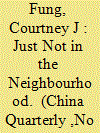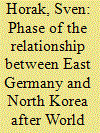|
|
|
Sort Order |
|
|
|
Items / Page
|
|
|
|
|
|
|
| Srl | Item |
| 1 |
ID:
090959


|
|
|
|
|
| Publication |
2009.
|
| Summary/Abstract |
Why has the Democratic People's Republic of Korea (DPRK) been so defiant against the international community? What could be its external and internal motivations to carry out new missile tests, and even a new nuclear test, in spring 2009 when its economy is in shambles and a large portion of its population is starving? Why has President Barack Obama's "smart power" diplomacy, which stresses dialogue with countries with which the United States has long had difficulties, not worked well with Pyongyang so far? Why does North Korea seem to be ignoring its key ally, China, and its concerns? Beijing is now in an awkward position as North Korea looks uninterested in bestowing any credibility on China's efforts to sustain the Six-Party Talks that are aimed at denuclearizing the Korean peninsula.
|
|
|
|
|
|
|
|
|
|
|
|
|
|
|
|
| 2 |
ID:
171182


|
|
|
|
|
| Summary/Abstract |
As the United States and North Korea pursue negotiations on a “denuclearization” agreement, the two countries should consider initiating cooperative measures as a way to build confidence and encourage finalization of a complete agreement. Based on lessons from the initial engagements carried out under the Cooperative Threat Reduction (CTR) program in states of the former Soviet Union (FSU), initial cooperation should focus on safety and security, training, and infrastructure elimination. By offering to implement these initiatives now while negotiations are underway, the United States could gain additional insights into North Korean intentions. These early initiatives could be proposed without compromising the US maximum-pressure campaign on North Korea by using the current authorities of the CTR program and carefully designing specific exemptions that may be required for any agreed measures. If North Korea is truly interested in pursuing disarmament efforts, the initial cooperative projects would enable them to begin reaping potential benefits while negotiations continue with sanctions still in place. These initial proposals could also be expanded to include additional international partners such as Russia, China, South Korea, and Japan. Such programs and initiatives would support and supplement longer-term strategies to address North Korean weapons-of-mass-destruction challenges.
|
|
|
|
|
|
|
|
|
|
|
|
|
|
|
|
| 3 |
ID:
179293


|
|
|
|
|
| Summary/Abstract |
Much has been written about China's active engagement and progressive approach to the “responsibility to protect,” a norm that reframes state sovereignty not as a right but as a responsibility. China's response to the “Report of the UN Commission of Inquiry on human rights in the Democratic People's Republic of Korea (DPRK),” which invokes the norm, however, challenges existing literature. China flatly refuses to uphold the responsibility to protect in the case of the DPRK, despite using previously supported standards to invoke the norm elsewhere and the report's dozens of consensual recommendations. This article is the first to systematically investigate how China has responded to the report. It shows that China's responses are shaped by its exceptionalism and concerns that the responsibility to protect could lead to regime change. I conclude with implications for the broader question of China's engagement with international norms in its near abroad. In my discussion, I draw on interviews with Korean and Chinese foreign policy elites, UN and US officials and DPRK human rights advocates, as well as primary and secondary documents.
|
|
|
|
|
|
|
|
|
|
|
|
|
|
|
|
| 4 |
ID:
090957


|
|
|
|
|
| Publication |
2009.
|
| Summary/Abstract |
The Democratic People's Republic of Korea (DPRK) is yet again on the U.S. policy radar screen. Despite President Barack Obama's declared intention to "extend a hand" to adversaries who would unclench their fist, Kim Jong-il decided to challenge rather than reciprocate.1 In a series of orchestrated, disproportionate actions justified as retaliation for the United Nations Security Council's condemnation of an attempted satellite launch in early April 2009, North Korea walked away from every denuclearization measure painfully and incompletely negotiated during the Bush administration's second term in office. On April 13, 2009, only hours after a non-binding Security Council presidential statement was issued, the DPRK described the statement as "an unbearable insult to our people and a criminal act never to be tolerated," asserted that it would never return to the Six-Party Talks, and that it would "boost its nuclear deterrent for self-defense in every way."2 Pyongyang declared that it would convert its entire inventory of plutonium into weapons, resume operations at its Yongbyon nuclear complex, and test intercontinental ballistic missiles. It again expelled inspectors from the International Atomic Energy Agency (IAEA) as well as U.S. personnel facilitating the disablement process at the reactor and associated facilities. The North also announced that it would accelerate pursuit of an enriched uranium capability, a program whose existence it had long denied.
|
|
|
|
|
|
|
|
|
|
|
|
|
|
|
|
| 5 |
ID:
095760


|
|
|
|
|
| Publication |
2010.
|
| Summary/Abstract |
Germany and Korea share the experience of being a divided country. However, the German experience is history but the Korean experience is still reality. This paper analyzes similarities and differences of the development of the relationship between the Democratic People's Republic of Korea (DPRK) and the German Democratic Republic (GDR) since the postwar period. The relational development of both states was determined by the ideological conflict between the superpower China and the USSR, therefore the relationship to one another changed over the years. In addition, this paper reports on massive, mostly unilateral East German donations to the DPRK, monetary and non-monetary, since the 1950s, making East Germany a major financier of reconstruction of North Korea after the Korean War.
|
|
|
|
|
|
|
|
|
|
|
|
|
|
|
|
|
|
|
|
|